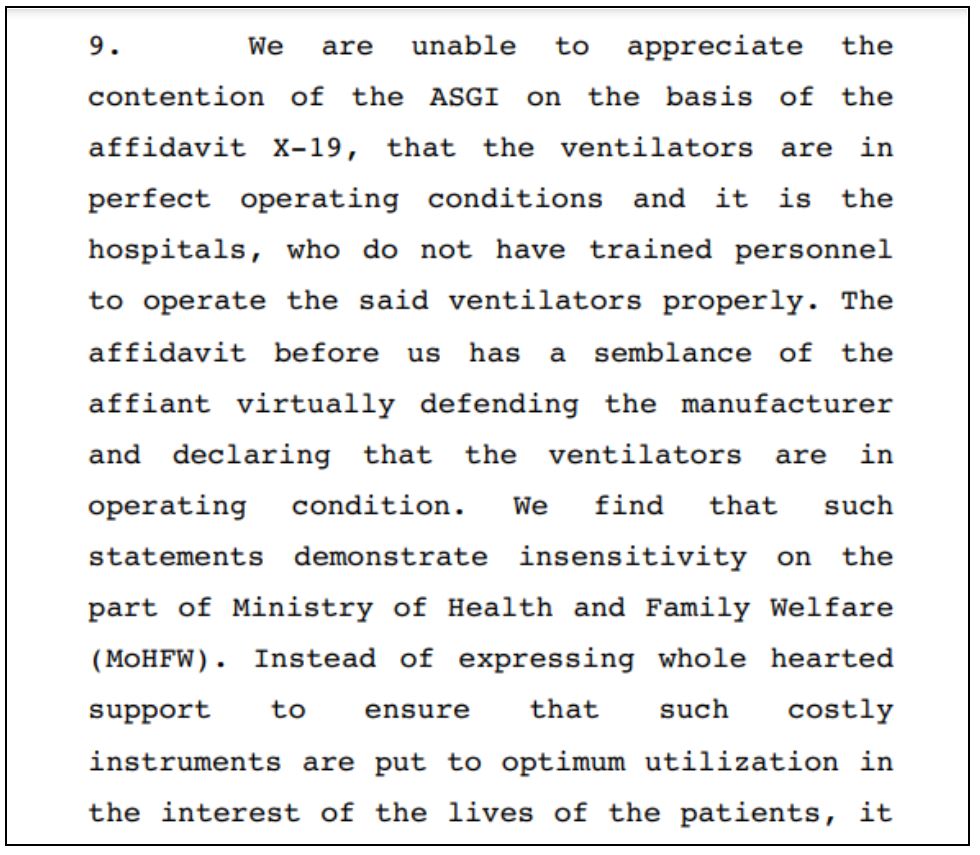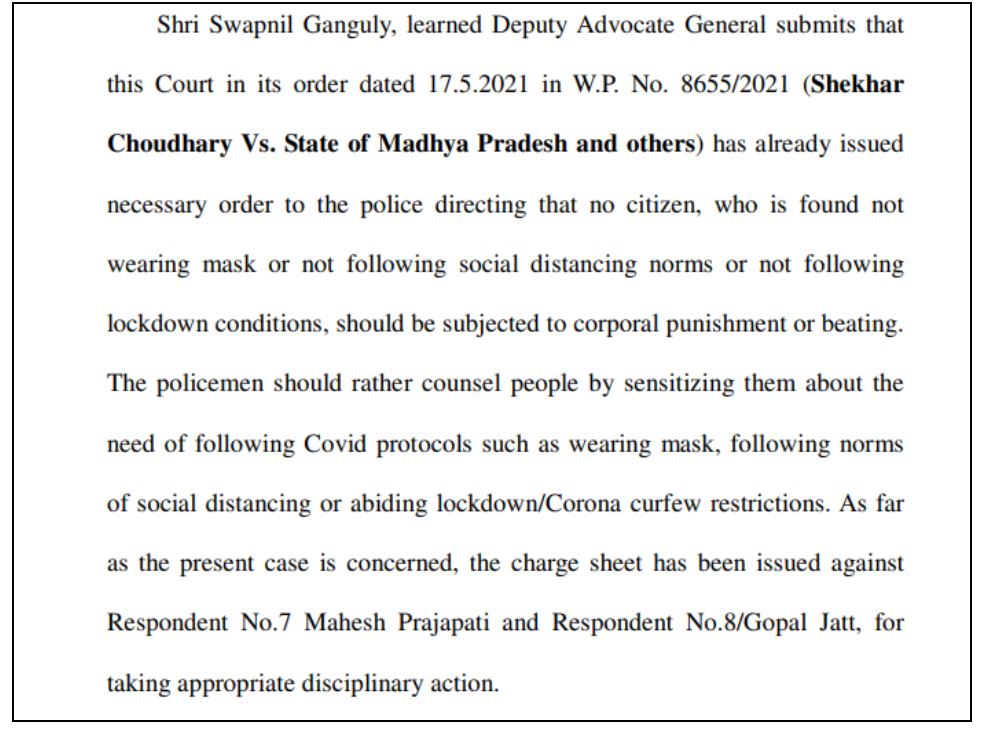In this roundup of court judgements, we look at Constitutional Courts’ remarks & directions on faulty ventilators, action against the police for beating up citizens on violation of covid protocols, and Kerala’s scholarship policy for minorities. The Supreme Court posed important questions to the Centre on its dual pricing and procurement policy for covid vaccines.
Bombay HC: MoHFW demonstrated insensitivity in defending faulty ventilators and claiming deficiency on part of doctors and paramedics.
Regarding the situation of dysfunctional ventilators supplied through the PM Cares Fund, the Bombay high court expressed displeasure with the Central Government for defending the manufacturer and claiming that the doctors and paramedics are not properly trained to handle the ventilators.
A total of 150 ventilators were received by the Government Medical College and Hospital, Aurangabad through the PM Cares Fund. Out of the 150 ventilators, 113 ventilators were put to use and found to be malfunctioning, while 37 ventilators remained un-boxed. Letters from authorities of government and private hospitals indicating that not a single ventilator was functional and private hospitals have therefore declined to utilise them as a serious threat to the life of the patients exists. Private hospitals have written to the authorities to take back these ventilators.
At the same time, it was clarified that the 64 ventilators supplied by several Industrial Establishments like Good Year Tyres, Cosmo Films, Bajaj Auto limited, Garware Polyester Limited, Hindalco limited, etc. are perfectly operational and are flawlessly working.
In response, the Additional Solicitor General of India (ASGI) tendered before the court an affidavit (dated 28 May 2021). Among other things, the affidavit clarified that:
- These 150 ventilators were never supplied through the PM Cares Funds. These ventilators are manufactured by M/s Jyoti CNC Automation Limited, Rajkot.
- All the ventilators have been tested and accompanied by an instruction/user manual. Intensive Digital Training for installation, operation and maintenance of ventilators is provided to the States by the Central Government for COVID-19 management.
- Doctors and paramedics are not properly trained to operate such ventilators at Aurangabad.
- MoHFW and the Procurement Central Public Sector Enterprise/Agency, namely HLL Lifecare Limited will organize an online Intensive Digital Training Course for doctors, Paramedics, Biomedical Engineers etc.
- The Ministry of Health & Family Welfare (MoHFW) sought an explanation from the Manufacturer and considering the explanation given by the Manufacturer, there is no material before the MoHFW to conclude that the ventilators are not working satisfactorily.
- All the 113 ventilators are showing operating status as `OK’, and hence, the present Criminal suo-moto PIL may be disposed of.
On the other hand, the Amicus curiae submit that not a single hospital/institution which was delivered with such ventilators has submitted a report that even one ventilator is operating satisfactorily. Since there is one year warranty on these machines and as the entire payment may have been made by the MoHFW through the public exchequer, it would be the duty of the manufacturer to ensure proper operation of the machines or replace them.
Upon examining all submissions, the high court observed that statements demonstrate insensitivity on the part of MoHFW. Instead of expressing wholehearted support to ensure that such costly instruments are made operational and put to optimum utilization, the affidavit found it advantageous to contend that ventilators are in perfect operating conditions and the deficiencies are with the hospitals and the doctors/paramedics/technicians.

The court noted that the affiant should have avoided entering into a blame game and instead shown sensitivity towards the patients. The court remarked that ‘the ASGI has addressed us as if he is holding the brief for the Manufacturer.’
In the backdrop of the above, the ASGI submitted that the MoHFW would take all remedial steps and ensure that the ventilators would operate normally and all defects, if any, would be removed. The matter has been adjourned to 02 June 2021.
Madhya Pradesh: Cannot subject citizens to corporal punishment for not following COVID-19 protocol.
In the case Osheen Sharma and others vs. State of Madhya Pradesh and others, the high court held that police cannot subject citizens to corporal punishment for not following COVID-19 protocol.
The court was hearing a writ petition in the form of public interest litigation filed by Osheen Sharma and others seeking direction to register FIR against Police Constables posted at Pardeshipura, Indore as they misused their powers and subjected innocent rickshaw-puller to merciless beating, allegedly for not wearing the mask in a proper manner.
In an earlier event, two policemen deployed at Malwa Mill Gate stopped an auto-rickshaw driver to explain why he was not wearing a mask properly, dragged him to the police station and beat him mercilessly. Similar incidents were reported from other parts of the state.

The court held that no citizen who is found not wearing a mask or not following social distancing norms or not following lockdown conditions should be subjected to corporal punishment, or beating. The policemen should rather counsel people by sensitizing them about the need of following COVID-19 protocols.
In conclusion, the high court directed the Superintendent of Police, Indore to take appropriate action against the erring police officials on complaints of excesses and beating.
Kerala HC: State must treat all notified minorities equally.
In the case Justine Pallivathukal v. State of Kerala and Ors., the high court quashed orders of the Kerala Government announcing scholarships to Muslim students and other minorities in the ratio 80:20.
The petitioner challenged orders of the Kerala Government announcing scholarships to Muslim students and other minority communities will be in the ratio 80:20 i.e., 80% to Muslim Community and 20% to Latin Christians and Converted Christians. It is contended that the fixation of ratio in is arbitrary, unjust and illegal and accordingly violative of Articles 14 and 15 of the Constitution of India.
The State Government filed a counter-affidavit stating that the Paloli Committee relied on statistics from the Justice Sachar Committee report and the Kerala Padana report for finalizing its report, which reveals Muslims are far behind Christians in the college enrolment (and even behind scheduled castes and scheduled tribes). It is also stated that the unemployment percentage is 55.2% among Muslims, while it is 31.9% among Christians and 40.2% among backward Hindus. With regards to land ownership, there are only 3% Christians who are landless while it is 37.8% among Muslims. In the matter of poverty also, there is a wide gap between Muslims and Christians.
The Court held that there is nothing wrong in the State Government providing facilities to weaker sections of the community, but when it comes to dealing with the notified minorities, ‘it has to treat them equally’. Hence, the court held that the order providing merit-cum-means scholarship at 80% to the Muslim community and 20% to the Latin Catholic Christians and Converted Christians cannot be legally sustained and directed the State to provide merit-cum-means scholarships to members of notified minority communities equally.
Supreme Court: Poses important questions on COVID-19 vaccine drive.
In a suo moto case on COVID-19 issues (In Re-Distribution of Essential Services and Supplies During Pandemic), the Supreme Court posed important questions to the Central Government about the rationale of its dual pricing and procurement policy of the COVID-19 vaccines, its diversion from the National Immunisation Programme and its mandate of COWIN App registration.
The bench expressed concern and questioned Centre’s vaccine procurement and pricing policy wherein the central government confine itself only to the post-45 age group and leave the pre-45 age group entirely to the states to arrange. The bench noted that different municipal corporations in the different states have issued global tenders. However, the capacity of the Bombay Municipal Corporation is higher than municipal corporations in West Bengal, UP or Tamil Nadu, which may not have the same kind of budget. Additionally, if the Centre leaves a major part of the vaccine procurement to the states, it may present a problem as different states have different economic conditions. To this, the court posed the following questions:
- Is it the policy of the government of India that every municipal corporation in the country and every state have its own device to issue the tender to procure vaccines from foreign suppliers?
- Will there be individual states or corporations receiving bids or will Centre be the nodal agency to obtain these bids and vaccines at one price?
The court held that Article 1 of the Constitution says Bharat is a union of states and not a federation of states. In a time of national crisis, it is the Union that must procure vaccines for the entirety of the country by negotiating. Individual states cannot be left in the lurch trying to negotiate. The court emphasized the Centre needs to give policy guidelines negotiating the price and distribution of vaccines for the entire nation.
The court highlighted that state governments have said that when they approach Serum Institute and Bharat Biotech, they are not dealing with them. The court also has on record that foreign manufacturers, when approached, refused to deal with anybody other than the central government.
The bench also highlighted that we are still in the nascent stage of vaccination and asked if the government has put out any study as regards the urban-rural share among those who have been vaccinated, as about 75% of the vaccination is being done only in the urban areas. Additionally, the court observed that those who have registered on the COWIN portal and do not get appointments at government dispensaries or hospitals are getting calls from the private hospitals to pay 900 or 1000 rupees to get vaccinated. Hence, for a family of 4, one has to pay about Rs. 4000 in a private hospital to get vaccinated immediately. The supreme court felt that for an average Indian family, it is an extremely high price and implies that money is important in order to get vaccinated immediately.
The court also flagged the issue of the digital divide in so far as everybody is required to register on the COWIN App to be able to get vaccinated. The court, thus, asked if it is realistically possible for people in the rural areas to register on COWIN.
The matter is still in progress and asked the Government of India to file an affidavit with the detailed vaccination policy in the next two weeks.
Featured Image: Important Court Judgements


